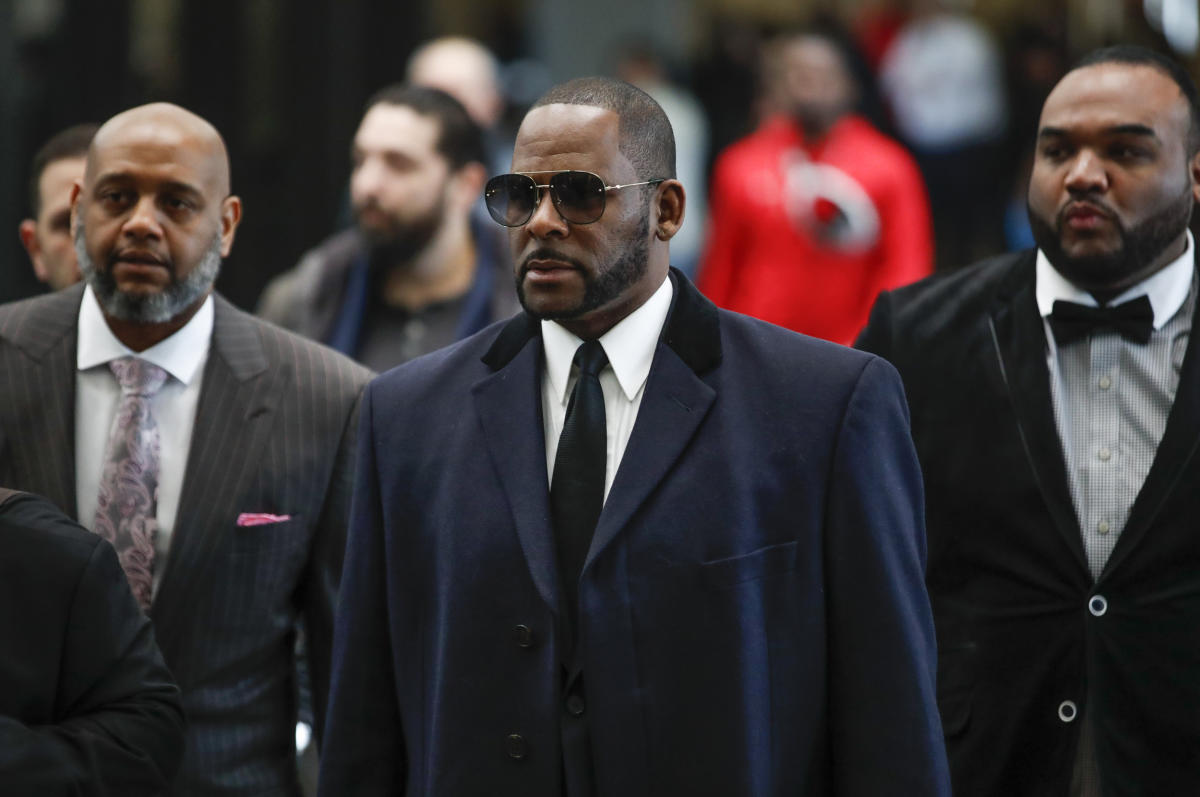
CHICAGO — Nearly two months after he was convicted and handed a 30-year prison sentence in New York on charges of federal racketeering and sex- trafficking, disgraced musician R. Kelly is set to return to court for a second federal trial, this time on charges of child pornography and obstruction of justice, in his hometown of Chicago.
Jury selection is scheduled to begin Monday in a case that stems from the complaints of several women who allege that Kelly, 55, lured them into sex acts while they were underage. At least two are expected to testify, according to court documents.
This trial is expected to resurface accusations brought against Kelly, whose full name is Robert Sylvester Kelly, 14 years ago in a state trial on charges of child pornography for which he was eventually acquitted.
Illinois federal prosecutors allege that Kelly obstructed justice in that 2008 criminal trial in Cook County, which involved a video recording of Kelly allegedly sexually abusing a minor.
The singer will be tried alongside his former business manager, Derrel McDavid, and associate, Milton “June” Brown, who are both accused of conspiring with Kelly to intimidate and bribe witnesses and cover up evidence in the 2008 trial, according to the federal charges against them.
Kelly has denied any wrongdoing.
Neither Kelly’s lawyers nor prosecutors responded to NBC News’ requests for comment.
Mary Higgins Judge, an attorney representing Brown, declined to comment. Brown pleaded not guilty to the charges against him.
Beau Brindley, an attorney for McDavid, said in a statement that during the time relevant to the charges in the case, he “did only one thing: he did his job.
“It was his job to protect Robert Kelly’s image and his career. To do that, he hired some of the best lawyers in the United States,” Brindley said. “Those are the only people with whom Mr. McDavid entered into any agreements relevant to this case. Mr. McDavid and these lawyers did their job. They executed it with excellence. That was not a crime then. It is not a crime now. We look forward to Mr. McDavid’s exoneration.”
How will the Illinois case differ from New York’s?
The trial is one in a series of federal and state cases stacked against Kelly in three states: New York, Illinois and Minnesota.
He was was convicted last year and sentenced to 30 years in prison in June in a federal court in New York on nine counts of racketeering and sex trafficking. Jurors in that case found that Kelly had set up a criminal enterprise that enabled him to recruit and transport underage girls for sex. An attorney for Kelly said he will appeal.
While the New York case, according to evidence and testimony presented in court, centered on racketeering charges and allegations that Kelly, his bodyguards, drivers, managers and others developed a decades-long scheme that resulted in the sexual abuse of young fans, the Illinois trial will focus on conduct during previous legal proceedings, and on video tapes allegedly made by Kelly that constituted child pornography.
In many ways this case will be a do-over of the 2008 trial, which had several key elements missing, said Micheal Leonard, a Chicago trial lawyer who worked briefly on Kelly’s defense team in 2020 for both the New York and Illinois indictments before withdrawing last year.
“This case is more centered on things that happened in the past, particularly with regard to the prior legal proceedings in state court in Illinois,’’ he said. “The government has a theory in this case that there was a cover-up or interference with his former trial and state court years and years ago, which is quite different from what they were doing in New York.”
In 2008, Kelly was tried in Cook County on child pornography charges. The trial centered on a 26-minute videotape sent anonymously to the Chicago Sun-Times in 2002 that allegedly showed Kelly performing sex acts with an underage girl. NBC News has not viewed the videotape.
However, the girl who purportedly appeared in the tape refused to testify at that trial, which jurors said made it difficult for them to convict Kelly.
The same video is in question again, with federal prosecutors now saying Kelly and his co-defendants “agreed to pay money and caused money to be paid on Kelly’s behalf to victims, witnesses, and others to ensure that they would not cooperate with law enforcement and would conceal and cover up evidence, including videos, relating to Kelly’s sexual contact and sexual acts with minors,” according to court filings. Kelly has denied any wrongdoing. His attorneys have not responded to a request for comment.
Court filings also allege that McDavid and Brown “agreed to intimidate, threaten, pressure, persuade, and attempt to persuade” the underage girls and their families at Kelly’s behest.
Leonard said testimony from the alleged victim in that case, who is expected to testify this time around, will be the crux of this case.
“Now, you have a person who says, ‘Hey, I really was the victim back then,’” he said.
Trial follows years of allegations against Kelly
Activists have long called for Kelly to face charges related to the long history of sexual abuse allegations against him.
Kenyette Tisha Barnes, who co-founded the #MuteRKelly social media campaign, a grassroots effort to pressure major streaming music services to remove Kelly’s discography from their platforms, said she believes the Illinois prosecution is important because it “illustrates the egregiousness and recklessness of his crimes spanning decades and states. In order for the survivors to heal, we have to make sure that every survivor has their day in court.”
She hopes that the city of Chicago can likewise “start to heal … as people in Chicago who have been systemically silenced have their day.”
“R. Kelly was an architect of the cultural scene in Chicago for three decades. Yes, he influenced the music and culture of South Chicago, which is predominantly African American. But there are other artists who also had impact, only they’re not sexual predators,” she said.
The #MuteRKelly movement notched a partial victory when YouTube removed his official artist channels in October 2021.
Jim DeRogatis, 57, was one of the first journalists who started reporting on the sexual abuse allegations against R. Kelly in the year 2000, first for the Chicago Sun-Times and later for BuzzFeed News.
DeRogatis said he believes it is important for R. Kelly to face justice in Chicago.
He said he hopes that this trial forces a “reckoning in Chicago,” because “every system in Chicago failed dozens of young Black girls for years” and “aside from the Chicago Sun-Times, the media ignored this story for too long.”
He expressed dismay over R. Kelly’s continued popularity in some circles as well as the pro-R. Kelly activity on social media and beyond: “The social media hatred I get is nothing compared to what R. Kelly’s victims get, but it’s still unprecedented and very disturbing.”




